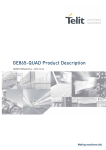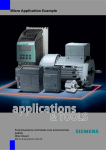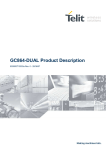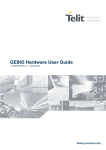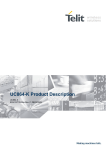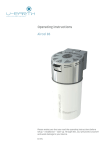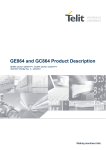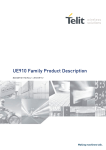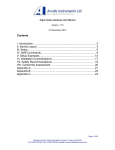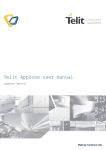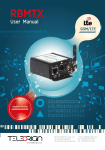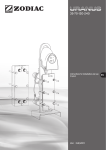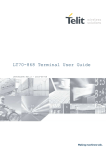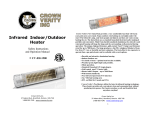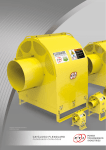Download GE866-QUAD Product Description
Transcript
SPECIFICATIONS SUBJECT TO CHANGE WITHOUT NOTICE Notice While reasonable efforts have been made to assure the accuracy of this document, Telit assumes no liability resulting from any inaccuracies or omissions in this document, or from use of the information obtained herein. The information in this document has been carefully checked and is believed to be entirely reliable. However, no responsibility is assumed for inaccuracies or omissions. Telit reserves the right to make changes to any products described herein and reserves the right to revise this document and to make changes from time to time in content hereof with no obligation to notify any person of revisions or changes. Telit does not assume any liability arising out of the application or use of any product, software, or circuit described herein; neither does it convey license under its patent rights or the rights of others. It is possible that this publication may contain references to, or information about Telit products (machines and programs), programming, or services that are not announced in your country. Such references or information must not be construed to mean that Telit intends to announce such Telit products, programming, or services in your country. Copyrights This instruction manual and the Telit products described in this instruction manual may be, include or describe copyrighted Telit material, such as computer programs stored in semiconductor memories or other media. Laws in the Italy and other countries preserve for Telit and its licensors certain exclusive rights for copyrighted material, including the exclusive right to copy, reproduce in any form, distribute and make derivative works of the copyrighted material. Accordingly, any copyrighted material of Telit and its licensors contained herein or in the Telit products described in this instruction manual may not be copied, reproduced, distributed, merged or modified in any manner without the express written permission of Telit. Furthermore, the purchase of Telit products shall not be deemed to grant either directly or by implication, estoppel, or otherwise, any license under the copyrights, patents or patent applications of Telit, as arises by operation of law in the sale of a product. Computer Software Copyrights The Telit and 3rd Party supplied Software (SW) products described in this instruction manual may include copyrighted Telit and other 3rd Party supplied computer programs stored in semiconductor memories or other media. Laws in the Italy and other countries preserve for Telit and other 3rd Party supplied SW certain exclusive rights for copyrighted computer programs, including the exclusive right to copy or reproduce in any form the copyrighted computer program. Accordingly, any copyrighted Telit or other 3rd Party supplied SW computer programs contained in the Telit products described in this instruction manual may not be copied (reverse engineered) or reproduced in any manner without the express written permission of Telit or the 3rd Party SW supplier. Furthermore, the purchase of Telit products shall not be deemed to grant either directly or by implication, estoppel, or otherwise, any license under the copyrights, patents or patent applications of Telit or other 3rd Party supplied SW, except for the normal non-exclusive, royalty free license to use that arises by operation of law in the sale of a product. Reproduction forbidden without Telit Communications S.p.A’s. written authorization - All Rights Reserved. Page 2 of 33 Usage and Disclosure Restrictions License Agreements The software described in this document is the property of Telit and its licensors. It is furnished by express license agreement only and may be used only in accordance with the terms of such an agreement. Copyrighted Materials Software and documentation are copyrighted materials. Making unauthorized copies is prohibited by law. No part of the software or documentation may be reproduced, transmitted, transcribed, stored in a retrieval system, or translated into any language or computer language, in any form or by any means, without prior written permission of Telit High Risk Materials Components, units, or third-party products used in the product described herein are NOT fault-tolerant and are NOT designed, manufactured, or intended for use as on-line control equipment in the following hazardous environments requiring fail-safe controls: the operation of Nuclear Facilities, Aircraft Navigation or Aircraft Communication Systems, Air Traffic Control, Life Support, or Weapons Systems (High Risk Activities"). Telit and its supplier(s) specifically disclaim any expressed or implied warranty of fitness for such High Risk Activities. Trademarks TELIT and the Stylized T Logo are registered in Trademark Office. All other product or service names are the property of their respective owners. Copyright © Telit Communications S.p.A. 2014 Reproduction forbidden without Telit Communications S.p.A’s. written authorization - All Rights Reserved. Page 3 of 33 Reproduction forbidden without Telit Communications S.p.A’s. written authorization - All Rights Reserved. Page 4 of 33 Contents 1. 2. 3. Introduction .................................................................................................................................. 8 1.1. Scope ....................................................................................................................................... 8 1.2. Audience.................................................................................................................................. 8 1.3. Contact Information, Support .................................................................................................. 8 1.4. Document Organization .......................................................................................................... 9 1.5. Text Conventions .................................................................................................................... 9 1.6. Related Documents ................................................................................................................. 9 The GE866-QUAD...................................................................................................................... 10 2.1. Product Overview .................................................................................................................. 10 2.2. Target Market ........................................................................................................................ 11 2.3. Product Features .................................................................................................................... 11 Product Description.................................................................................................................... 15 3.1. Size and 2D mechanical drawing .......................................................................................... 15 3.2. Environmental requirements ................................................................................................. 16 3.2.1. 3.2.2. Temperature range ..................................................................................................................... 16 RoHS compliance ...................................................................................................................... 16 3.3. Operating Frequencies........................................................................................................... 16 3.4. Transmitter output power ...................................................................................................... 16 3.5. Receiver sensitivity ............................................................................................................... 16 3.6. Antenna ................................................................................................................................. 17 3.7. Supply voltage ....................................................................................................................... 17 3.8. Power consumption ............................................................................................................... 17 3.9. The user interface .................................................................................................................. 17 3.10. Speech CODEC ................................................................................................................. 18 3.11. SIM Reader ........................................................................................................................ 18 3.12. SMS ................................................................................................................................... 18 3.13. Real Time Clock and Alarm .............................................................................................. 18 3.14. Enhanced Measurement Report ......................................................................................... 18 3.15. Data transmission capabilities ........................................................................................... 18 3.16. Local security management ............................................................................................... 19 Reproduction forbidden without Telit Communications S.p.A’s. written authorization - All Rights Reserved. Page 5 of 33 3.17. Call control ........................................................................................................................ 19 3.18. Phonebook ......................................................................................................................... 19 3.19. Characters management ..................................................................................................... 19 3.20. SIM related functions ........................................................................................................ 19 3.21. Call status indication ......................................................................................................... 19 3.22. Automatic answer (Voice, Data) ....................................................................................... 19 3.23. Supplementary services (SS) ............................................................................................. 19 3.24. Acoustic signaling ............................................................................................................. 20 3.25. Buzzer output ..................................................................................................................... 20 3.26. RF Transmission Monitor (RFTXMON) .......................................................................... 20 3.27. RF Transmission Control................................................................................................... 20 3.28. TTY (Telephone Text)....................................................................................................... 21 3.29. Logic level specifications .................................................................................................. 21 3.30. Audio ................................................................................................................................. 21 3.30.1. 3.30.2. Analog ........................................................................................................................................ 21 Digital ........................................................................................................................................ 21 3.31. Serial Ports ......................................................................................................................... 21 3.32. Converters .......................................................................................................................... 21 3.32.1. 3.32.2. ADC Converter .......................................................................................................................... 21 DAC Converter .......................................................................................................................... 21 3.33. Mounting the GE866-QUAD on your Board .................................................................... 21 3.34. Packing system .................................................................................................................. 22 4. Evaluation Kit ............................................................................................................................. 23 5. Software Features ....................................................................................................................... 24 5.1. IP Easy Extension.................................................................................................................. 24 5.1.1. Overview .................................................................................................................................... 24 5.2. Multisocket ............................................................................................................................ 24 5.3. Jamming Detection ................................................................................................................ 25 5.3.1. 5.4. CMUX ................................................................................................................................... 25 5.4.1. 5.4.2. 5.5. Overview .................................................................................................................................... 25 Architecture................................................................................................................................ 25 Features ...................................................................................................................................... 25 Easy Script Extension - Python interpreter ........................................................................... 26 Reproduction forbidden without Telit Communications S.p.A’s. written authorization - All Rights Reserved. Page 6 of 33 5.5.1. 5.5.2. 5.6. SAP: SIM Access Profile ...................................................................................................... 27 5.6.1. 5.6.2. 5.6.3. 5.7. Architecture................................................................................................................................ 27 Implementation features ............................................................................................................. 28 Remote SIM Message Command Description ........................................................................... 28 Premium FOTA Management (PFM) Service ...................................................................... 29 5.7.1. 5.8. Overview .................................................................................................................................... 26 Python 1.5.2+ Copyright Notice ................................................................................................ 27 FOTA (Firmware Over The Air) ............................................................................................... 29 AT Commands ...................................................................................................................... 29 6. SAFETY RECOMMENDATIONS .......................................................................................... 30 7. List of acronyms ......................................................................................................................... 31 8. Document History ....................................................................................................................... 33 Reproduction forbidden without Telit Communications S.p.A’s. written authorization - All Rights Reserved. Page 7 of 33 Scope of this document is giving an overview of the Telit GE866-QUAD module, which is a compact GSM/GPRS module with data and voice capabilities. This document is intended for customers who are evaluating the GE866-QUAD. For general contact, technical support, to report documentation errors and to order manuals, contact Telit’s Technical Support Center (TTSC) at: [email protected] [email protected] [email protected] [email protected] Alternatively, use: http://www.telit.com/en/products/technical-support-center/contact.php For detailed information about where you can buy the Telit modules or for recommendations on accessories and components visit: http://www.telit.com To register for product news and announcements or for product questions contact Telit's Technical Support Center (TTSC). Our aim is to make this guide as helpful as possible. Keep us informed of your comments and suggestions for improvements. Telit appreciates feedback from the users of our information. Reproduction forbidden without Telit Communications S.p.A’s. written authorization - All Rights Reserved. Page 8 of 33 This document contains the following chapters: “Chapter 1: “Introduction” provides a scope for this document, target audience, contact and support information, and text conventions. “Chapter 2: “The GE866-QUAD” gives an overview of the features of the product. “Chapter 3: “Product Description” describes in details the characteristics of the product. “Chapter 4: “Evaluation Kit” provides some basic information about the Evaluation Kit. “Chapter 5: “Software Features” provides an overview of the software features of the products. “Chapter 6: “Safety Recommendation” provides some safety recommendations that must be follow by the customer in the design of the application that makes use of the GE866-QUAD. “Chapter 7: “List of acronyms” “Chapter 8: “Document history” Danger – This information MUST be followed or catastrophic equipment failure or bodily injury may occur. Caution or Warning – Alerts the user to important points about integrating the module, if these points are not followed, the module and end user equipment may fail or malfunction. Tip or Information – Provides advice and suggestions that may be useful when integrating the module. All dates are in ISO 8601 format, i.e. YYYY-MM-DD. 1VV0301051 GE866-QUAD Hardware User Guide Reproduction forbidden without Telit Communications S.p.A’s. written authorization - All Rights Reserved. Page 9 of 33 The GE866-QUAD is the smallest generation in Telit’s 2G module portfolio. With its ultracompact 15 x 19 mm LGA footprint, it is designed for those m2m applications requiring miniature foot print. It is a quad-band 850/900/1800/1900 MHz GSM / GPRS communication product based on the market’ latest 2G core which allows integrators to plan on availability for even the longest lifecycle applications, highly recommended for new designs specified for 2G coverage worldwide. It is highly recommended for new designs requiring 2G coverage in an ultra-small and robust LGA package, which implies easy integration and low impact on final application size and costs. Ease of production and small foot print makes it the ideal solution for applications in security alarms, automated meter reading, and pos terminals. The product is fully voice capable, the analog and digital audio interfaces make it suitable for applications such as voice enabled alarm panels, mHealth patient monitors and specialty phones such as those for the elderly or sensory-impaired. The GE866-QUAD operates with 1.8 V GPIOs, minimizing power consumption and making it even more ideally suited for battery powered and wearable device applications. The GE866-QUAD makes it possible to run the customer's application inside the module by means its embedded Python Script Interpreter, thus making it a complete SMT platform for m2m solutions. All Telit modules, support Over-the-Air firmware update by means Premium FOTA Management. By embedding Red Bend Software vRapid Mobile® agent, a proven and battletested technology powering hundreds of millions of cellular handsets world-wide Telit is able to update its products by transmitting only a delta file, which represents the difference between one firmware version and another. Reproduction forbidden without Telit Communications S.p.A’s. written authorization - All Rights Reserved. Page 10 of 33 The GE866-QUAD is designed and developed for the usage in applications, such as: Battery powered, wearable devices Automated Meter Reading (AMR) Security alarms and non-video surveillance Self-powered asset tracking POS terminals GE866-QUAD: Quad-band GSM 850/900/1800/1900 MHz GSM/GPRS protocol stack 3GPP Release 4 compliant Output power - Class 4 (2W) @ 850/900 MHz - Class 1 (1W) @ 1800/1900 MHz Control via AT commands according to 3GPP 27.005, 27.007 and Telit custom AT commands Control via Remote AT commands Power consumption (typical values) - Power off: 2 uA - Idle: 0.9 mA @ DRX=9 Serial port multiplexer 3GPP 27.010 SIM Application Toolkit 3GPP TS 51.014 SIM Access Profile Extended Supply voltage range: 3.10 – 4.50 V DC (3.8 V DC nominal) TCP/IP stack access via AT commands Sensitivity: ≤- 108 dBm (typ.) @ 850/900 MHz ≤- 107 dBm (typ.) @ 1800/1900 MHz DARP/SAIC support Enhanced Measurement Report support Dimensions: 19 x 15 x 2.2 mm Storage and Operating temperature range: -40°C to +85°C Reproduction forbidden without Telit Communications S.p.A’s. written authorization - All Rights Reserved. Page 11 of 33 Interfaces 7 I/O ports maximum Analog audio (balanced) Digital audio 1 A/D plus 1 D/A converters Buzzer output ITU-T V.24 serial link through CMOS UART: - Baud rate from 300 to 115.200 bps - Autobauding up to 115.200 bps Audio Telephony, emergency call Half rate, full rate, enhanced full rate and adaptive multi rate voice codecs (HR, FR, EFR, AMR) Superior echo cancellation & noise reduction Multiple audio profiles pre-programmed and fully configurable Embedded DTMF decoder Approvals Fully type approved conforming with R&TTE directive GCF FCC, IC PTCRB RoHS compliant SMS Point-to-point mobile originated and mobile terminated SMS Concatenated SMS supported SMS cell broadcast Text and PDU mode SMS over GPRS Reproduction forbidden without Telit Communications S.p.A’s. written authorization - All Rights Reserved. Page 12 of 33 Circuit switched data transmission Asynchronous non-transparent CSD up to 9.6 kbps V.110 GPRS data GPRS class 10 Mobile station class B Coding scheme 1 to 4 PBCCH support GERAN Feature Package 1 support (NACC, Extended TBF) GSM Supplementary Services Call forwarding Call barring Call waiting & call hold Advice of charge Calling line identification presentation (CLIP) Calling line identification restriction (CLIR) Unstructured supplementary services mobile originated data (USSD) Closed user group Additional features SIM phonebook Fixed dialling number (FDN) Real Time Clock Alarm management Network LED support IRA, GSM, 8859-1 and UCS2 character sets Jamming detection Embedded TCP/IP stack, including TCP, IP, UDP, SMTP, ICMP and FTP protocols EASY SCAN ® automatic scan over GSM frequencies (also without SIM card) Reproduction forbidden without Telit Communications S.p.A’s. written authorization - All Rights Reserved. Page 13 of 33 Python* application resources Python* script interpreter (module takes the application code directly in the Python* language) Memory: 800 kB of NV memory for the user scripts and 1 MB RAM for the Python* engine usage Over-the-air application SW update [*]Copyright © 1991–1995 by Stichting Mathematisch Centrum, Amsterdam, The Netherlands; All Rights Reserved. Copyright © 1995–2001 Corporation for National Research Initiatives; All Rights Reserved. Copyright © 2001–2009 Python Software Foundation; All Rights Reserved. All Rights Reserved are retained in Python. Reproduction forbidden without Telit Communications S.p.A’s. written authorization - All Rights Reserved. Page 14 of 33 The Telit GE866-QUAD module overall dimensions are: Length: 19 mm Width: 15 mm Thickness: 2.2 mm Reproduction forbidden without Telit Communications S.p.A’s. written authorization - All Rights Reserved. Page 15 of 33 –40°C ÷ +85°C Storage and Operating Temperature Range As a part of Telit’s corporate policy of environmental protection, the GE866-QUAD product comply with the RoHS (Restriction of Hazardous Substances) directive of the European Union (EU Directive 2011/65/EU). The operating frequencies in GSM, DCS modes are conform to the GSM specifications. Mode Freq. TX Freq. RX Channels (MHz) (MHz) (ARFC) 824.2-848.8 869.2-893.8 124 ÷ 251 45 MHz 890.0 - 914.8 935.0 - 959.8 0 ÷ 124 45 MHz 880.2 - 889.8 925.2 - 934.8 975 ÷ 1023 45 MHz DCS 1800 1710.2 - 1784.8 1805.2 - 1879.8 512 ÷ 885 95 MHz PCS 1900 1850.2-1909.8 1930.2-1989.8 512 ÷ 810 80 MHz GSM 850 TX - RX offset GSM 900 The GE866-QUAD transceiver modules operating mode in GSM 850 / 900 bands is Class 4 in accordance with the specifications which determine the nominal 2W peak RF power (+33dBm) on 50 Ohm. In the DCS 1800 / PCS 1900 bands, the operating mode is Class 1 in accordance with the specifications, which determine the nominal 1W peak RF power (+30dBm) on 50 Ohm. Sensitivity of the module in GSM 850 / 900 bands is better than –108 dBm (2.4% BER Class II - static channel) in normal operating conditions. Sensitivity of the module in GSM 1800 / 1900 bands is better than –107 dBm (2.4% BER Class II - static channel) in normal operating conditions. The GE866-QUAD supports also the Downlink Advance Receiver Performance (DARP) feature for single antenna interference cancellation (SAIC). Reproduction forbidden without Telit Communications S.p.A’s. written authorization - All Rights Reserved. Page 16 of 33 The antenna and antenna transmission line on PCB for a Telit GE866-QUAD device shall fulfill the following requirements: Frequency range Depending by frequency band(s) provided by the network operator, the customer shall use the most suitable antenna for that/those band(s). Bandwidth 70 MHz in GSM 850, 80 MHz in GSM 900, 170 MHz in DCS and 140 MHz in PCS band For further information please refer to the GE866-QUAD Hardware User Guide. The external power supply must be connected to VBATT & VBATT_PA signals and must fulfill the following requirements: Nominal Supply Voltage 3.8 V Normal Operating Voltage Range 3.40 V – 4.20 V Extended Operating Voltage Range (*) 3.10 V – 4.50 V (*) Please refer to the GE866-QUAD Hardware User Guide to use the product with the extended operating voltage range. The current consumptions of the Telit GE866-QUAD in power-off and idle modes are: Switched off current typical (Module power supplied only on VBATT_PA pin, the VBATT pin is not power supplied.) 2 uA Idle registered, power saving 0.9 mA @ DRX=9 with AT+CFUN=5 Please check the HW User Guide for further details about all other power consumption figures. The user interface is managed by AT commands according to ITU-T V.250, 3GPP 27.007 and 27.005 specifications. Moreover, custom AT commands are also available. Please refer to the AT Command User Guide for details. Reproduction forbidden without Telit Communications S.p.A’s. written authorization - All Rights Reserved. Page 17 of 33 The GE866-QUAD supports the following voice codec: HR - Half Rate FR - Full Rate EFR - Enhanced Full Rate AMR-HR, AMR Half Rate AMR-FR, AMR Full Rate The GE866-QUAD supports phase 2 SIM at 1.8V and 3V ONLY with an external SIM connector. For 5V SIM, an external level translator can be added. The GE866-QUAD supports the following SMS types: Mobile Terminated (MT) class 0 – 3 with signaling of new incoming SMS, SIM full, SMS read Mobile Originated class 0 – 3 with writing, saving in SIM and sending Cell broadcast compatible with CB DRX with signaling of new incoming SMS. The GE866-QUAD also supports SMS over GPRS The GE866-QUAD supports the Real Time Clock and Alarm functions through AT commands. An alarm output pin can be configured to indicate the alarm with a hardware line output. Furthermore the Voltage Output of the RTC power supply is provided so that a backup battery can be added to increase the RTC autonomy during power off of the main battery (power supply). The GE866-QUAD supports the Enhanced Measurement Report on SACCH channel according to 3GPP TS 44.018 version 4.22.0 Release 4 (par. 3.4.1.2, 9.1.54, 9.1.55) and 3GPP TS 45.008 version 4.17.0 Release 4 (par. 8.4.8). The Telit GE866-QUAD is a mobile station class B supporting GPRS Class 10, coding schemes 1 to 4 and PBCCH. Moreover, it supports GERAN feature package 1, which consist in supporting the Extended Uplink TBF and Network Assisted Cell Change (NACC). Reproduction forbidden without Telit Communications S.p.A’s. written authorization - All Rights Reserved. Page 18 of 33 As for circuit switched data, the GE866-QUAD supports asynchronous non-transparent data up to 9.6 Kbps. Moreover, it supports the V.110. The local security management can be done with the lock of Subscriber Identity module (SIM). The security code will be requested at power–up. The call cost control function is supported. This function allows the storage of the telephone numbers in SIM memory. The capability depends on SIM version and its embedded memory. The GE866-QUAD supports the IRA, GSM, 8859-1 and UCS2 characters sets, in TEXT and PDU mode. Fixed Dialing Numbers (FDN), Abbreviated Dialing Number (ADN) and PIN insertion are supported. Extension at the PIN2 for the PUK2 insertion capability for lock condition is supported too. The call status indication is supported. The automatic answer is supported. The user/application can specify the number of rings after which the module will automatically answer. The user/application can set the number of rings by means of the command ATS0=<n>. The following supplementary services are supported: Call Barring, Call Forwarding, Calling Line Identification Presentation (CLIP), Calling Line Identification Restriction (CLIR), Call Waiting, other party call Waiting Indication, Reproduction forbidden without Telit Communications S.p.A’s. written authorization - All Rights Reserved. Page 19 of 33 Call Hold, other party Hold / Retrieved Indication, Closed User Group supplementary service (CUG), Advice of Charge, Unstructured SS Mobile Originated (MO) The acoustic signaling of the GE866-QUAD on the selected acoustic device are the following: Call waiting; Ringing tone; SMS received tone; Busy tone; Power on/off tone; Off Hook dial tone; Congestion tone; Connected tone; Call dropped; No service tone; Alarm tone. The GPIO6 pad, when configured as Buzzer Output, is controlled by the GE866-QUAD module and will drive a Buzzer driver with appropriate square waves. This permits to your application to easily implement Buzzer feature with ringing tones or melody played at the call incoming, tone playing on SMS incoming or simply playing a tone or melody when needed. The GPIO5 pin, when configured as RFTXMON Output, is controlled by the GE866-QUAD module and will rise when the transmitter is active and fall after the transmitter activity is completed. Please refer to the GE866-QUAD Hardware User Guide for further information. The GPIO4 pin, when configured as RF Transmission Control Input, permits to disable the Transmitter when the GPIO is set to Low by the application. In the design is necessary to add a resistor 47K pull up to 2.8V, this pull up must be switched off when the module is in off condition. Reproduction forbidden without Telit Communications S.p.A’s. written authorization - All Rights Reserved. Page 20 of 33 The TTY feature is supported. Please refer to 3GPP TS 26.226 and 3GPP TS 26.231 for details. Where not specifically stated, all the interface circuits work at 1.8V CMOS logic levels. To get more detailed information about the logic level specifications used in the GE866-QUAD, please check the Hardware User Guide. The GE866-QUAD offers one audio line balanced. For more details, please refer to the GE866-QUAD Hardware User Guide. The GE866-QUAD offers the digital voice interface. For more details, please refer to the Digital Voice Interface Application Note. Two serial ports are available on the module: MODEM SERIAL PORT 1 (Main, ASC0) MODEM SERIAL PORT 2 (Auxiliary, ASC1) The GE866-QUAD provides a Digital to Analog Converter. The signal (named DAC_OUT) is available on pin E4 of the GE866-QUAD. The GE866-QUAD has one on board DAC, which is a 10 bit converter, able to generate an analogue value based a specific input in the range from 0 up to 1023. However, an external low-pass filter is necessary. See the Hardware User Guide for the details. The Telit GE866-QUAD module has been designed to be compliant with a standard lead-free SMT process. For detailed information about PCB pad design and conditions to use in SMT process please check with the GE866-QUAD Hardware User Guide. Reproduction forbidden without Telit Communications S.p.A’s. written authorization - All Rights Reserved. Page 21 of 33 The Telit GE866-QUAD is supplied in in reels of 500pcs each (TBC) and in trays of 50 pieces each when small quantities are required, please refer to the Hardware User Guide for further details. Reproduction forbidden without Telit Communications S.p.A’s. written authorization - All Rights Reserved. Page 22 of 33 In order to assist the customer in the development of the application, Telit offers the EVK2 Evaluation Kit that can be ordered separately. The EVK2 has a SIM card holder, the RS 232 serial port level translator, a direct UART connection, audio and antenna connector. The EVK2 provides a fully functional solution for a complete data or phone application. The standard serial RS232 9 pin connector placed on the Evaluation Kit allows the connection of the EVK2 system with a PC or other DTE. The development of the applications utilizing the Telit GE866-QUAD module must present a proper design of all the interfaces towards and from the module (e.g. power supply, audio paths, level translators), otherwise a decrease in the performance will be introduced or, in the worst case, a wrong design can even lead to an operating failure of the module. In order to assist the hardware designer in his project phase, the EVK2 board presents a series of different solutions, which will cover the most common design requirements on the market, and which can be easily integrated in the OEM design as building blocks or can be taken as starting points to develop a specific one. For a detailed description of the Telit Evaluation Kit, please refer to the documentation provided with the Telit GE866-QUAD Hardware User Guide and EVK2 User Manual. Reproduction forbidden without Telit Communications S.p.A’s. written authorization - All Rights Reserved. Page 23 of 33 The IP Easy feature allows the Telit GE866-QUAD user to contact a device in internet and establish with it a raw data flow over the GPRS and Internet networks. This feature can be seen as a way to obtain a "virtual" serial connection between the Application Software on the Internet machine involved and the controller of the Telit GE866QUAD module, regardless of all the software stacks underlying. Virtual Serial Link Local Application IP EASY Serial Line Driver Remote Application IP EASY TCP/UDP IP IP IP TCP/UDP IP Data on Board Driver V. 24 V. 24 Controller Device Telit‘s Module L2 Network Interworking L2 L1 GPRS Network and Internet L1 Remote Device This particular implementation allows to the devices interfacing to the Telit GE866-QUAD module the use of the GPRS and Internet packet service without the need to have an internal TCP/IP stack since this function is embedded in the module. For more detailed information regarding the use of the IP Easy feature, please consult IP Easy User Guide and AT Commands Reference Guide. The multisocket is an extension of Telit IP Easy feature, which allows the user to have two contexts activated (that means two different IP address), more than one socket connection (with a maximum of 6) and simultaneous FTP client service. For more detailed information please consult the IP Easy User Guide. Reproduction forbidden without Telit Communications S.p.A’s. written authorization - All Rights Reserved. Page 24 of 33 The Jammer Detect feature allows the GE866-QUAD to detect the presence of a disturbing device such as a Communication Jammer and give indication to the user. This feature can be very important in alarm, security and safety applications that rely on the module for the communications. In these applications, the presence of a Jammer device can compromise the whole system reliability and functionality and therefore shall be recognized and reported to the local system for countermeasure actions. CMUX (Converter-Multiplexer) is a multiplexing protocol implemented in the GE866QUAD that can be used to send any data, SMS, or TCP data. The Multiplexer mode enables one serial interface to transmit data to four different customer applications. This is achieved by providing four virtual channels using a Multiplexer (MUX). This is especially advantageous when a data/GPRS call is ongoing. Using the Multiplexer features, e.g. controlling the module or using the SMS service can be done via the additional channels without disturbing the data flow; access to the second UART is not necessary. Furthermore, several accesses to the module can be created with the Multiplexer. This is of great advantage when several independent electronic devices or interfaces are used. To access the three virtual interfaces, both the GSM engine and the customer application must contain MUX components, which communicate over the multiplexer protocol. In Multiplexer mode, AT commands and data are encapsulated in packets. Each packet has channel identification and may vary in length. 3GPP 27.010 CMUX Basic Option used CMUX implementation support four full DLCI (Serial Port) Every CMUX instance has its own user profile storage in NVM Independent setting of unsolicited message. Every CMUX instance has its own independent flow control NOTE: More details about the Multiplexer mode are available in the CMUX User Guide. Reproduction forbidden without Telit Communications S.p.A’s. written authorization - All Rights Reserved. Page 25 of 33 The Easy Script Extension is a feature that allows driving the modem "internally", writing the controlling application directly in a nice high level language: Python. The Easy Script Extension is aimed at low complexity applications where the application was usually done by a small microcontroller that managed some I/O pins and the GE866-QUAD through the AT command interface. A schematic of such a configuration can be: EXTERNAL CONTROLLER FLASH ROM GE866-QUAD RAM PHYSICAL AT SERIAL PORT GSM-GPRS Protocol Stack FLASH ROM memory AT commands GPRS MODEM ENGINE RAM for GSM-GPRS modem Protocol Stack HARDWARE RESOURCES In order to not use any external controller, and further simplify the programming of the sequence of operations, the customer can benefit of the following features: Python script interpreter engine v. 1.5.2+ 800 kB of Non Volatile Memory room for the user scripts and data 1 MB RAM reserved for Python engine usage Reproduction forbidden without Telit Communications S.p.A’s. written authorization - All Rights Reserved. Page 26 of 33 The Python code implemented in the Telit module is copyrighted by Stichting Mathematisch Centrum, this is the license: Copyright © 1991-1995 by Stichting Mathematisch Centrum, Amsterdam, The Netherlands. All Rights Reserved Copyright (c) 1995-2001 Corporation for National Research Initiatives; All Rights Reserved. Copyright (c) 2001, 2002, 2003, 2004 Python Software Foundation; All Rights Reserved. Copyright (c) 2001-2008 Python Software Foundation; All Rights Reserved. All Rights Reserved are retained in Python. Permission to use, copy, modify, and distribute this software and its documentation for any purpose and without fee is hereby granted, provided that the above copyright notice appear in all copies and that both that copyright notice and this permission notice appear in supporting documentation, and that the names of Stichting Mathematisch Centrum or CWI or Corporation for National Research Initiatives or CNRI not be used in advertising or publicity pertaining to distribution of the software without specific, written prior permission. While CWI is the initial source for this software, a modified version is made available by the Corporation for National Research Initiatives (CNRI) at the Internet address ftp://ftp.python.org. STICHTING MATHEMATISCH CENTRUM AND CNRI DISCLAIM ALL WARRANTIES WITH REGARD TO THIS SOFTWARE, INCLUDING ALL IMPLIED WARRANTIES OF MERCHANTABILITY AND FITNESS, IN NO EVENT SHALL STICHTING MATHEMATISCH CENTRUM OR CNRI BE LIABLE FOR ANY SPECIAL, INDIRECT OR CONSEQUENTIAL DAMAGES OR ANY DAMAGES WHATSOEVER RESULTING FROM LOSS OF USE, DATA OR PROFITS, WHETHER IN AN ACTION OF CONTRACT, NEGLIGENCE OR OTHER TORTIOUS ACTION, ARISING OUT OF OR IN CONNECTION WITH THE USE OR PERFORMANCE OF THIS SOFTWARE. NOTE: More details about the Python modules are available in the Easy Script in Python User Guide. The SAP feature allows the module to use the SIM of a remote SIM Server. This feature is implemented using special AT Command on a Virtual circuit of the CMUX interface. Reproduction forbidden without Telit Communications S.p.A’s. written authorization - All Rights Reserved. Page 27 of 33 SAP is based on 3GPP 27.010 CMUX Basic Option used Only SAP Client features Logic HW flow control is recommended on the Virtual instance selected for the SAP command. The module sends request commands to the client application through a binary message that is crowned in the CMUX message. The client application shall extract the message and send it to the SAP server, through the appropriate protocols (e.g. by RFCOMM, that is the Bluetooth serial port emulation entity). The client application shall extract all the messages sent by SAP server and put them in the CMUX message, to be sent to the module. The module fulfills the following feature requirements: Connection management Transfer APDU Transfer ATR Power SIM on Report Status Error Handling Every feature needs some procedures support: Feature Connection Management Transfer APDU Transfer ATR Power SIM on Report Status Error Handling Procedure Connect Report Status Transfer ATR Disconnection Initiated by the Client Disconnection Initiated by the Server Transfer APDU Transfer ATR Power SIM on Transfer ATR Report Status Error Response Report Status, Disconnection Initiated by the Server and Error Response are independent messages sent by server. The other procedures consist of couples of messages, started by client. NOTE: More details about the SAP are available in the SAP User Guide. Reproduction forbidden without Telit Communications S.p.A’s. written authorization - All Rights Reserved. Page 28 of 33 The premium FOTA Management Service provides a cost-effective, fast, secure and reliable way for wirelessly reflashing the firmware on mobile devices, ensuring that embedded software is up-to-date with the latest enhancements and features. Customers, who want to benefit from this service, must pass through the Telit certification program, where Telit will assist the customer in validating the correct implementation of FOTA. Telit, which has signed a partnership agreement with the worldwide leader of Firmware OTA technology Red Bend, has integrated its unique vCurrent® Mobile client software in its m2m product portfolio. Telit is therefore able to upgrade its products by transmitting only a delta file, which represents the difference between one firmware version and another. See “PFM Application Note” for details in www.telit.com > Product > GSM/GPRS > Product Family > Application Notes. The Telit GE866-QUAD module can be driven via the serial interface using the standard AT commands. The Telit GE866-QUAD module is compliant with: 1. Hayes standard AT command set to maintain the compatibility with existing SW programs. 2. 3GPP 27.007 specific AT command and GPRS specific commands. 3. 3GPP 27.005 specific AT commands for SMS (Short Message Service) and CBS (Cell Broadcast Service) Moreover the GE866-QUAD module supports also Telit proprietary AT commands for special purposes. For a more information about AT commands supported by the GE866-QUAD module please refer to document AT Commands Reference Guide. Reproduction forbidden without Telit Communications S.p.A’s. written authorization - All Rights Reserved. Page 29 of 33 READ CAREFULLY Be sure the use of this product is allowed in the country and in the environment required. The use of this product may be dangerous and has to be avoided in the following areas: Where it can interfere with other electronic devices in environments such as hospitals, airports, aircrafts, etc Where there is risk of explosion such as gasoline stations, oil refineries, etc It is the responsibility of the user to enforce the country regulation and the specific environment regulation. Do not disassemble the product; any mark of tampering will compromise the warranty validity. We recommend following the instructions of the hardware user guides for a correct wiring of the product. The product has to be supplied with a stabilized voltage source and the wiring has to be conforming to the security and fire prevention regulations. The product has to be handled with care, avoiding any contact with the pins because electrostatic discharges may damage the product itself. Same cautions have to be taken for the SIM, checking the instruction for its use carefully. Do not insert or remove the SIM when the product is in power saving mode. The system integrator is responsible for the functioning of the final product; therefore, care has to be taken to the external components of the module, as well as any project or installation issue, because the risk of disturbing the GSM network or external devices or having impact on the security. Should there be any doubt, please refer to the technical documentation and the regulations in force. Every module has to be equipped with a proper antenna with specific characteristics. The antenna has to be installed with care to avoid any interference with other electronic devices and has to guarantee a minimum distance from the body (20 cm). In case this requirement cannot be satisfied, the system integrator has to assess the final product against the SAR regulation. The European Community provides some Directives for the electronic equipment introduced on the market. All the relevant information’s are available on the European Community website: http://ec.europa.eu/enterprise/rtte/dir99-5.htm The text of the Directive 99/05 regarding telecommunication equipment is available, while the applicable Directives (Low Voltage and EMC) are available at: http://ec.europa.eu/enterprise/electr_equipment/index_en.htm Reproduction forbidden without Telit Communications S.p.A’s. written authorization - All Rights Reserved. Page 30 of 33 ACM ASCII AT CB CBS CCM CLIP CLIR CMOS CR CSD CTS DAI DCD DCE DRX DSR DTA DTE DTMF DTR EMC ETSI FTA GPRS GSM HF IMEI IMSI IRA ITU IWF LCD LED LF ME MMI MO MS MT OEM PB Accumulated Call Meter American Standard Code for Information Interchange Attention commands Cell Broadcast Cell Broadcasting Service Call Control Meter Calling Line Identification Presentation Calling Line Identification Restriction Complementary Metal-Oxide Semiconductor Carriage Return Circuit Switched Data Clear To Send Digital Audio Interface Data Carrier Detected Data Communications Equipment Data Receive Data Set Ready Data Terminal Adaptor Data Terminal Equipment Dual Tone Multi Frequency Data Terminal Ready Electromagnetic Compatibility European Telecommunications Equipment Institute Full Type Approval (ETSI) General Radio Packet Service Global System for Mobile communication Hands Free International Mobile Equipment Identity International Mobile Subscriber Identity International Reference Alphabet International Telecommunications Union Inter-Working Function Liquid Crystal Display Light Emitting Diode Linefeed Mobile Equipment Man Machine Interface Mobile Originated Mobile Station Mobile Terminated Other Equipment Manufacturer Phone Book Reproduction forbidden without Telit Communications S.p.A’s. written authorization - All Rights Reserved. Page 31 of 33 PDU PH PIN PLMN PUCT PUK RACH RLP RMS RTS RI SCA SIM SMD SMS SMSC SS TIA UDUB USSD Protocol Data Unit Packet Handler Personal Identity Number Public Land Mobile Network Price per Unit Currency Table PIN Unblocking Code Random Access Channel Radio Link Protocol Root Mean Square Ready To Send Ring Indicator Service Center Address Subscriber Identity Module Surface Mounted Device Short Message Service Short Message Service Center Supplementary Service Telecommunications Industry Association User Determined User Busy Unstructured Supplementary Service Data Reproduction forbidden without Telit Communications S.p.A’s. written authorization - All Rights Reserved. Page 32 of 33 Revision 0 1 2 Date 2013-10-02 2014-02-07 2014-09-05 Changes First issue Updated power consumption, packing system Updated “Size and 2D mechanical drawing” Reproduction forbidden without Telit Communications S.p.A’s. written authorization - All Rights Reserved. Page 33 of 33

































